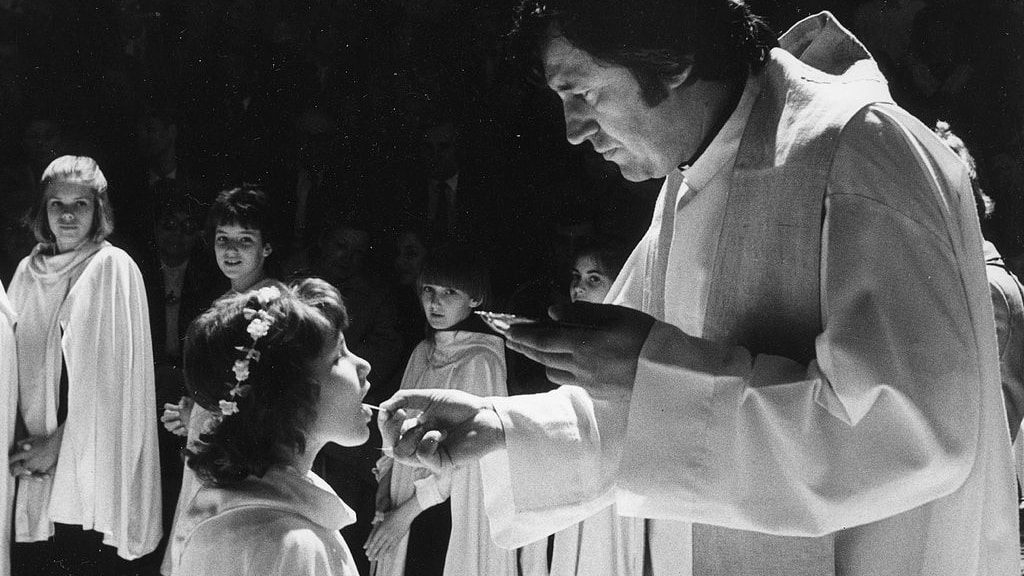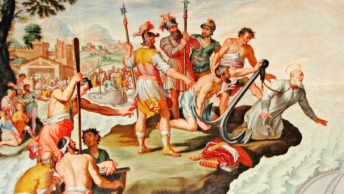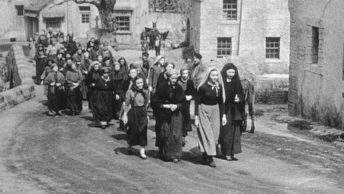A wise old priest was visited by a worried man, who said, “Father, I raised my children Catholic, but my oldest son left the Church after being influenced by some of his Fundamentalist and Evangelical friends. They filled his head with all sorts of criticisms of our Catholic Faith, which he then uses to argue with me. For instance, they say that in their churches they have an altar call, in which people can come forward as a public sign of their willingness to give themselves to Jesus—and then my son challenges me, ‘So why don’t Catholics have an altar call?’ How do I respond to that?” The priest answered him, “We do have an altar call at every single Mass; as an act of faith in the Eucharistic Lord and of our willingness to place our lives in His hands, Catholics walk forward to the altar and receive Jesus in Holy Communion—and there’s no greater expression of faith than that.” As the truth of the priest’s words dawned on him, the man smiled in delight and exclaimed, “Thank you, Father! Now I know how to answer my son!”
Receiving Jesus in Holy Communion is indeed meant to be a genuine expression of faith on our part, and a way of surrendering ourselves more completely to Him. We as Catholics are very privileged to share in a Sacrament not available to other Christians, and we must not take this Gift for granted or respond to our God in an ungrateful or half-hearted manner. The Lord of all creation humbly allows Himself to be placed on our tongues or in our hands—but only if our hearts are truly open to Him in this sacred moment do we have the assurance of salvation.
One of the characteristics of 21st century Americans is that we like to keep our options open—but the problem with this approach to life is that if we keep refusing to commit ourselves to a higher purpose, life will sooner or later become empty and meaningless. It is important that we commit ourselves to God. Under the leadership of the Old Testament hero Joshua (24:1-2, 15-18), the Israelites solemnly promised to serve the Lord God—and when they lived up to that commitment, God blessed them and allowed them to dwell in the Promised Land with prosperity and security. It was when they turned away from God and disobeyed His commandments that national disaster occurred. The Lord is always willing to bless His people, but He expects a genuine commitment and, if necessary, a willingness to make sacrifices on their part. Happy husbands and wives understand this truth very well; that’s why St. Paul (Ephesians 5:21-32) is able to use the image of marriage to describe the intimate and loving union between Christ and the Church. In fact, couples who marry in church are not only making a public commitment to each other, but also in a sense making an altar call, asking God to be a part of their marriages—and so it’s no surprise that statistically, they divorce much less frequently than couples who are only civilly married, and have much happier lives together than couples who simply live together, or cohabitate, without any sort of marriage ceremony.
The idea of commitment is also central to understanding the Gospel of John (6:60-69). Jesus had spoken at great length about the need to eat His flesh and drink His blood in order to be truly alive; some of His disciples couldn’t accept this teaching, and would no longer follow Him. When the Lord then asked the apostles if they also wanted to leave, Peter—speaking for all of them—made a magnificent expression of faith, and a commitment to continue following Jesus even though they didn’t fully understand His words. In effect, the apostles were making an altar call, and all of them—except for Judas the betrayer—went on to become great saints and thus merit everlasting glory and eternal happiness.
What about us? When we come forward to receive Holy Communion, we are supposed to be making an altar call—but do we truly understand what this means and believe in what we’re doing? I think there are three things in particular we need to remember.
First of all, by coming up for Communion, we are acknowledging that this truly is Our Lord’s Body and Blood, and not just a symbol or an empty action or ritual. Surveys suggest many Catholics don’t really understand or believe the Church’s teaching on the Eucharist—but that must never be true of us. No one has the right to come forward for this Sacrament without believing Jesus’ teaching that the Eucharist truly is His Body and Blood; by receiving Him, we are making a commitment to believe in His words.
Secondly, our altar call—our coming forward for Communion—proclaims that we are in a state of grace, for Scripture and Church Tradition clearly teach that no one may receive Our Lord unworthily, or while in a state of serious sin. To do so is a sacrilege, or a serious act of disrespect toward something holy. That’s why we offer the option of coming forward with arms folded as a sign of a desire to receive a simple blessing instead, and that’s why the Church insists Catholics guilty of any serious or mortal sin must go to Confession first before receiving Communion. The Church takes the Eucharist very seriously, and in receiving It, we are promising that we do, as well.
Thirdly, our altar call every weekend is a way of announcing that we need and want the Eucharistic Grace of Jesus during the coming week. Yes, we are weak, sinful people struggling to know and do what’s right, while trying our best to cope with life’s problems, burdens, and disappointments. By receiving Holy Communion, however, we proclaim that Jesus is the Lord of our lives, that we are committed to Him despite the troubles of life and the opposition of this world, and that we desire and intend to remain faithful to Him, regardless of the circumstances and no matter what the cost.
Perhaps you never thought of your reception of Holy Communion in these terms before, but this is a valid and important understanding. Our weekly altar call is meant to be a real commitment to Jesus Christ, an expression of our openness to the grace of this Sacrament, and a firm promise to follow Him as members of His Holy Catholic Church. As He did with the apostles, Our Lord asks us whether we want to abandon Him or follow Him—and at every Mass we attend, we have the chance to give Him our answer.








